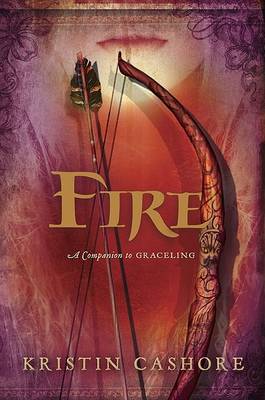Reviewed by Briana @ Pages Unbound on
The same creative treatment given to the protagonist is given to the Dells. Though located in the same world as the seven kingdoms of Graceling, the Dells is distinct, but off so thoroughly from the other kingdoms by a mountain range that the people have never heard of the other countries or of Gracelings. Which means, vice versa, that readers have never heard of anything quite like the Dells until now—a world where rainbow monsters stalk, both animal and human. Cashore essentially starts from scratch here, and gives readers a setting just as detailed as her first.
Unfortunately, the entire premise of Fire can be hard to relate to. Literally every person who sees Fire fall immeasurably into love or lust with her. Heterosexual females are insanely jealous. She is just that beautiful. And the monster animals? They all want her, too. One look at the hair that earned her her name, and they all go wild in their desire to kill and possess her. Don’t even ask what happens when Fire is on her period and they can smell her blood.
Fire does her best to reject all this attention and exude a “woe is me” attitude, and, truly, it must be annoying to be stared at whereever you go and have men constantly trying to touch you and propose marriage. But most readers will have experienced nothing like this and will find it difficult to sympathize deeply with Fire. Cashore might have made Fire’s attractive power more effective if she had toned it down. Also, her weariness of being so admired occasionally leaves her to sound a bit whiny. “I’m tired and sad, but I still look beautiful when really I want to look a mess so that my outside reflects my inner turmoil!” The troubles of being gorgeous.
Fire’s (and really everyone’s) acceptance of casual sex is also somewhat concerning. Katsa is almost irrationally against marriage in Graceling, but she appears to see sex as something to be shared with someone she loves. Fire sees sex as a comfort she can get from her friend Archer. Archer sees sex as something to do with every woman he ever comes across. His attitude on this topic can make it hard to like him as much as Fire does and as much as Cashore apparently wants readers to. By the end of the story, readers know far more about who slept with whom than they might have ever wanted to. And, of course, there is the convenient fantasy herbal version of (obviously infallible) birth control. So nice all of this can happen without too many consequences.
On a side note here, Fire spends an awful lot of time thinking about how much she wants babies and being jealous of any woman who does have a child. This would have been fine, except that it often reads like some sort of response to Katsa’s aversion to having children. Cashore’s hand in making Fire different from Katsa is a little too evident here, even though Fire does have some very legitimate and moving reasons for her feelings.
Fire is well-written and fast-paced. The characters are complex and the world is absolutely magic. In many ways, however, it is very different from Graceling. Readers will have to decide which one they like better, or if they like both.
Reading updates
- Started reading
- 11 July, 2012: Finished reading
- 11 July, 2012: Reviewed
